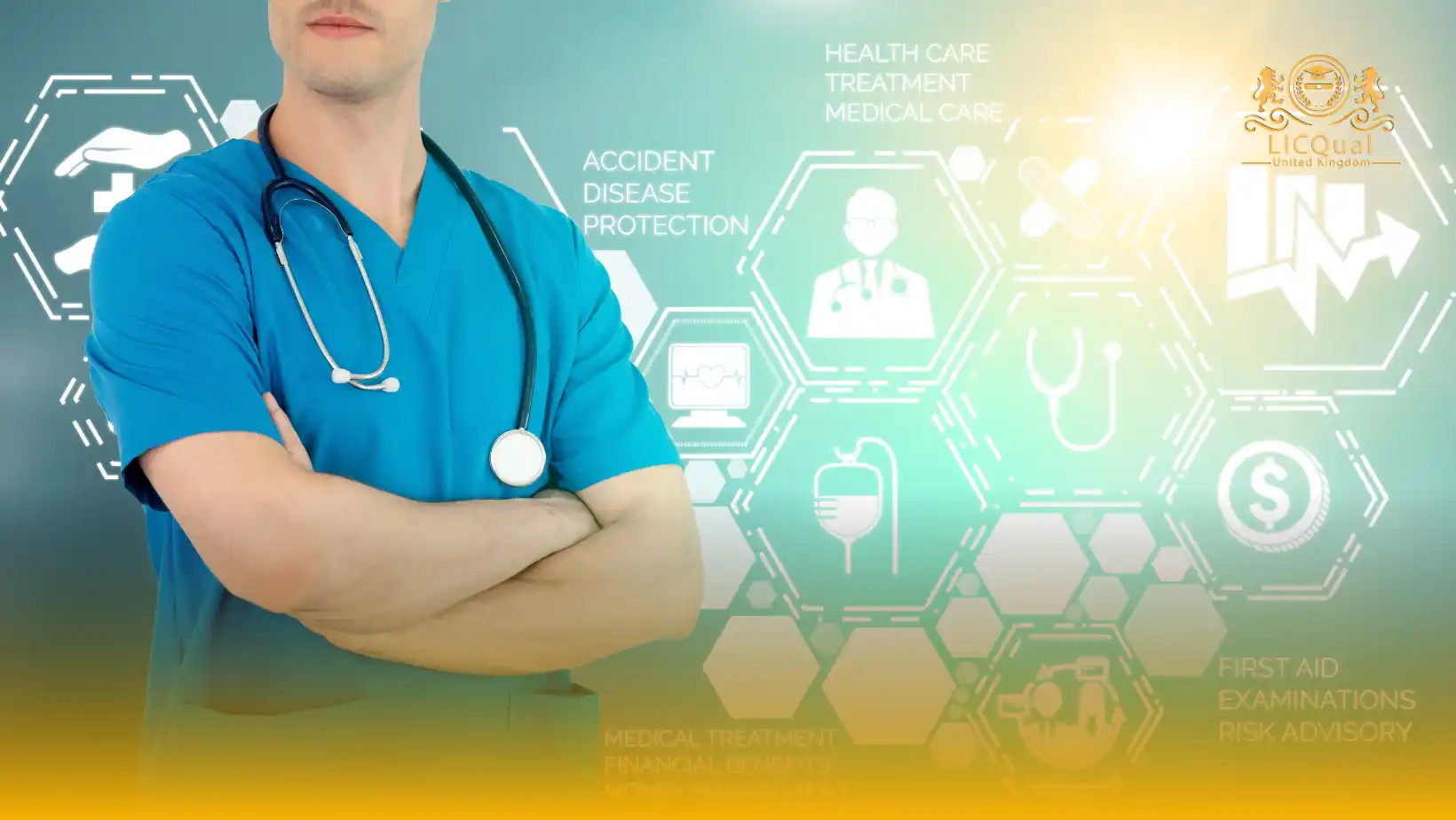The LICQual Level 3 Diploma in Healthcare Risk Management is a specialized qualification designed for healthcare professionals, managers, and individuals working within healthcare settings who wish to deepen their understanding of risk management principles and practices. This diploma is not intended for fresh entrants but is specifically tailored for learners seeking to enhance their career prospects, expand their professional knowledge, and engage in Continuing Professional Development (CPD).
Through this course, learners will explore critical aspects of healthcare risk management, including risk assessment, incident reporting, regulatory compliance, and the implementation of effective risk mitigation strategies. By applying theoretical knowledge to practical scenarios, learners will develop the skills necessary to identify, evaluate, and manage risks in healthcare environments, ensuring patient safety and organisational efficiency.
Centres delivering the LICQual Level 3 Diploma in Healthcare Risk Management must maintain high standards of education by employing competent and qualified staff, providing up-to-date learning materials, and ensuring access to all necessary resources. This commitment ensures that learners receive comprehensive guidance, practical insights, and the support required to succeed in their studies and achieve professional growth.
Upon completion of this diploma, learners will gain a recognised credential that demonstrates their expertise in healthcare risk management, enhances their professional credibility, and positions them to contribute strategically to safer healthcare practices. This qualification is ideal for healthcare practitioners, managers, and policy makers who are committed to improving patient outcomes, strengthening organizational risk frameworks, and advancing their careers in the healthcare sector.
Course Overview
Qualification Title
LICQual Level 3 Diploma in Healthcare Risk Management
Total Units
6
Total Credits
60
GLH
240
Qualification #
LICQ2200743
Qualification Specification
To enroll in the LICQual Level 3 Diploma in Healthcare Risk Management, applicants must meet the following criteria:
|
Qualification# |
Unit Title |
Credits |
GLH |
|---|---|---|---|
|
LICQ2200743-1 |
Introduction to Healthcare Risk Management |
10 |
40 |
|
LICQ2200743-2 |
Risk Assessment and Mitigation Strategies |
10 |
40 |
|
LICQ2200743-3 |
Incident Reporting and Investigation |
10 |
40 |
|
LICQ2200743-4 |
Regulatory Compliance and Legal Frameworks |
10 |
40 |
|
LICQ2200743-5 |
Health and Safety in Healthcare Settings |
10 |
40 |
|
LICQ2200743-6 |
Contemporary Issues and Challenges in Healthcare Risk Management |
10 |
40 |
By the end of this course, learners will be able to:
Unit 1: Introduction to Healthcare Risk Management
By the end of this unit, learners will be able to:
- Explain the core principles and concepts of healthcare risk management.
- Identify the different types of risks in healthcare environments.
- Analyse the role of risk management in improving patient safety and organisational efficiency.
- Apply basic risk management concepts to practical healthcare scenarios.
Unit 2: Risk Assessment and Mitigation Strategies
By the end of this unit, learners will be able to:
- Identify, evaluate, and prioritise risks in healthcare settings.
- Develop and implement strategies to mitigate risks effectively.
- Analyse the importance of proactive risk management in reducing incidents and errors.
- Apply risk assessment frameworks and tools to real-world healthcare situations.
Unit 3: Incident Reporting and Investigation
By the end of this unit, learners will be able to:
- Explain the procedures and best practices for reporting healthcare incidents.
- Analyse incident investigation techniques to identify root causes.
- Develop skills to document incidents and produce actionable recommendations.
- Apply incident reporting and investigation methods to improve patient safety and compliance.
Unit 4: Regulatory Compliance and Legal Frameworks
By the end of this unit, learners will be able to:
- Examine legal and regulatory requirements relevant to healthcare risk management.
- Analyse the implications of non-compliance for healthcare organisations.
- Evaluate healthcare policies, guidelines, and standards for risk management.
- Apply regulatory frameworks to ensure safe and effective healthcare practices.
Unit 5: Health and Safety in Healthcare Settings
By the end of this unit, learners will be able to:
- Explain occupational health and safety requirements in healthcare environments.
- Analyse potential hazards and implement control measures to protect staff and patients.
- Apply health and safety principles to prevent accidents and maintain compliance.
- Evaluate organisational safety policies and recommend improvements.
Unit 6: Contemporary Issues and Challenges in Healthcare Risk Management
By the end of this unit, learners will be able to:
- Critically evaluate emerging risks and challenges in healthcare, including technological, ethical, and financial risks.
- Analyse the impact of demographic changes and evolving healthcare practices on risk management.
- Develop strategies to address complex healthcare risk scenarios.
- Apply critical thinking to enhance risk management processes and decision-making.
This qualification is specifically designed for professionals and learners seeking to enhance their knowledge and skills in managing risks within healthcare environments. It is ideal for:
- Healthcare Practitioners: Nurses, doctors, allied health professionals, and clinical staff aiming to understand and manage risks in their workplace.
- Healthcare Managers and Administrators: Individuals responsible for operational management, patient safety, and risk mitigation strategies within healthcare organisations.
- Risk Management Professionals: Staff working in healthcare risk assessment, compliance, or quality assurance roles.
- Policy Makers and Regulatory Staff: Individuals involved in developing policies, guidelines, or frameworks for safe and effective healthcare practices.
- Professionals Committed to CPD: Learners seeking to expand their professional knowledge, enhance their career prospects, and engage in Continuing Professional Development (CPD).
- Organisational Leaders: Leaders wishing to implement effective risk management strategies, improve patient safety, and ensure regulatory compliance.
By enrolling in this diploma, learners will gain a recognized qualification that demonstrates their expertise in healthcare risk management, enhances professional credibility, and equips them to contribute strategically to safer healthcare practices and improved organizational performance.
Centres delivering the LICQual Level 3 Diploma in Healthcare Risk Management must ensure high-quality learning experiences and learner success by meeting the following requirements:
- Qualified and Competent Staff: Centres must employ tutors and assessors with relevant qualifications and professional experience in healthcare, risk management, or related fields, and with expertise in delivering Level 3 programmes.
- Comprehensive Learning Resources: Centres should provide learners with access to up-to-date textbooks, case studies, research articles, digital resources, and practical materials that support effective learning and application of healthcare risk management principles.
- Teaching and Learning Facilities: Centres must offer suitable learning environments, including classrooms or digital platforms, computer access, internet connectivity, and any specialised software required for research, analysis, or assessment tasks.
- Assessment and Quality Assurance Systems: Centres should have robust procedures for learner assessment, feedback, and quality monitoring to ensure compliance with LICQual standards and international best practices.
- Support for Learners: Centres must provide guidance, mentoring, and additional support to help learners successfully complete assignments, case studies, and practical assessments.
- Commitment to Professional Development: Centres are expected to facilitate ongoing professional development for both staff and learners to maintain high standards of teaching, learning, and practical application.
By meeting these requirements, centres ensure that learners receive a high-quality educational experience, acquire essential skills in healthcare risk management, and achieve a recognized qualification that supports career advancement and professional credibility within the healthcare sector.
Assessment and Verification
All units within this qualification are subject to internal assessment by the approved centre and external verification by LICQual. The qualification follows a criterion-referenced assessment approach, ensuring that learners meet all specified learning outcomes.
To achieve a ‘Pass’ in any unit, learners must provide valid, sufficient, and authentic evidence demonstrating their attainment of all learning outcomes and compliance with the prescribed assessment criteria. The Assessor is responsible for evaluating the evidence and determining whether the learner has successfully met the required standards.
Assessors must maintain a clear and comprehensive audit trail, documenting the basis for their assessment decisions to ensure transparency, consistency, and compliance with quality assurance requirements.







